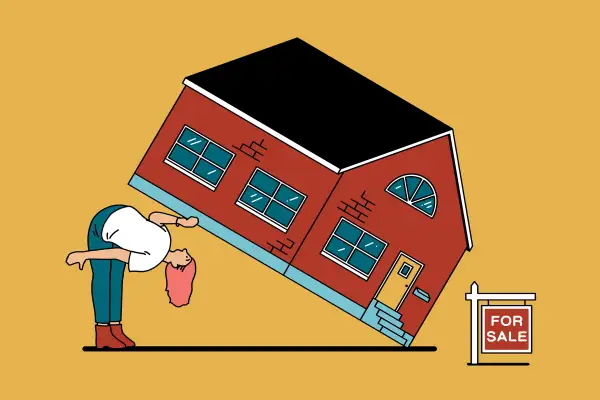7 Common Home Buying Mistakes and How to Avoid Them

Homebuying errors can be costly. Choosing the wrong lender might mean a too-high interest rate or a monthly payment you can’t afford. Shoddy research could leave you stuck in the wrong neighborhood or living in a house that doesn’t suit your needs or taste.
Whether financial or lifestyle-cramping, you’ll live with the repercussions of a buying mistake for years — maybe even decades.
Want to make sure your home purchase goes off without a hitch? Here’s what real estate pros say are the most common buyer mistakes — and how to avoid them on your home buying journey.
1. Skipping the financial prep
As exciting as it is to buy a new home, you don’t want to dive in before you’re financially ready — or have enough cash in the bank.
“I’ve seen buyers fail to save enough money, believing they only need sufficient cash to cover the down payment,” says Carolina Gerdts, executive vice president at RelatedISG Realty in Aventura, Florida. “There are many other costs associated with a purchase. They’ll need to pay closing costs, homeowners' insurance and property taxes, just to name a few.”
Closing costs average around 2% to 5% of the loan amount and typically need to be paid up front. You will also need funds saved for other costs of homeownership — like maintenance and eventual repairs, too. For this, State Farm says you can expect to spend at least 1% to 4% of your home’s value annually (so between $4,500 and $18,000 on a median-priced house). Think of it like an emergency fund for your home.
Prepping your credit is another important financial step before buying a house. Lenders will consider both your credit score and credit report — which shows your debt and payment history — when evaluating your eligibility for a loan. Your credit score will also directly impact the interest rate you get on that loan and, subsequently, your monthly mortgage payment.
“When you’re getting ready to buy a home, you should absolutely know your credit score,” says Scott Bergmann, an agent with Realty ONE Group in Omaha, Nebraska. “Certain lenders and loans require certain credit scores, and the better the credit score, the lower your interest rate.”
Most banks and credit card issuers offer free credit score monitoring, but if yours doesn’t, you can request your score from credit bureaus Experian, TransUnion or Equifax (it may cost a small fee). A 760 score or higher will generally qualify you for the best interest rates, so if yours is below this point, take time to improve it before moving forward with your home purchase.
The credit bureaus are also offering free weekly access to your credit report though the end of 2023. Disputing any errors on your report, paying off debt to improve your debt-to-income ratio and avoiding late payments can all help increase your score. Requesting a credit line increase on your credit cards may help, too (just make sure you don’t spend any of it). It’s also a good idea to avoid any new credit accounts in the months before you plan to buy.
2. Choosing the wrong neighborhood for you
It’s not just financial decisions. Focusing only on the house — and not where the house is actually located — is another big faux pas, according to pros.
“The No. 1 mistake we see is homebuyers jumping into their search without taking the time to find a town that syncs with their lifestyle,” says Tim Ossmo, CEO of real estate advisory service Suburban Jungle. “Many people go straight into looking at listings on homebuying websites. The problem with this approach is that buyers can settle for a house that may look great but is in not in a town that meets their needs.”
Ossmo recommends taking a “town-first approach” to house hunting — one that prioritizes the community over the house itself.
“The search takes a long time, and it’s important to really understand the inner workings of a neighborhood before starting a life there,” Ossmo says. “Explore a neighborhood’s local coffee shops, parks, sporting events and more prior to making the move.”
Factors like school district and commute times should also come into play. You can even drive from the neighborhood to work and back (during rush hour) or rent a local Airbnb to really get a feel for living there.
“Location is the most important factor when you’re buying, both in terms of value and lifestyle,” says Dina Goldentayer, executive director of sales at Douglas Elliman in Miami Beach. “Often buyers — especially those relocating from out of state — think they want to live in one specific area, but they haven’t spent enough time in it, getting to know the neighborhood. You need to understand whether or not the area fits your lifestyle.”
3. Failing to set a clear monthly budget
Not having a clearly established budget is another mistake real estate professionals say they see often. It’s particularly problematic in a seller’s market when bidding wars are common (and you need to adjust your bid quickly to win) or when mortgage rates are volatile.
“With rising interest rates, having a comprehensive view of what you can afford at any time is incredibly important,” says Heather Harmon, head of Opendoor Finance. “Even a small change in interest rates can impact your buying decision and cause a scramble for buyers.”
She’s right: If you could afford a $2,000 monthly payment, for example, a 7% rate would mean buying a home priced at $300,000 or less. If that rate jumped to 7.5%? Your home price max would drop to $286,000.
This is why it’s crucial to have a good pulse on what monthly mortgage payment you can afford. To get a good idea of this, try a home affordability calculator. Just keep in mind: The price range and monthly payment it gives you are the maximum a lender is likely to approve — not the actual amount you should aim to spend.
Don’t forget to factor in things like homeowners insurance, property taxes and utility bills. If your down payment is less than 20% of the purchase price, you’ll also need to think about private mortgage insurance (aka PMI). “It's important to have a cushion in your budget in case of any unexpected expenses,” says Alex Shekhtman, CEO of LBC Mortgage in Los Angeles.
4. Forgetting to check renovation history and HOA rules
The way a house looks is only the tip of the iceberg. If you want to ensure a home’s really the right fit for your needs, you’ll have to dig deeper and find out how it’s constructed — something many homeowners fail to do.
“One of the most common mistakes I see homeowners make is neglecting to check if recent renovations have been performed by a licensed contractor,” says DJ Olhausen, a real estate agent with Realty ONE Group in San Diego.
It might sound like a small slip-up, but uncontracted work can often indicate shoddy craftsmanship — not to mention, costly repairs down the line.
“While even licensed contractors can make mistakes, they are usually bonded and insured, and will defend their work with a warranty,” Olhausen says. “Unlicensed contractors are more likely to disappear after the work is completed, leaving the new homebuyer — not home seller — in charge of fixing any costly mistakes that have been made.”
In most states, the seller must disclose any major work done on the home. You can also ask the listing agent for the contractor’s name and license number who performed the work (or have your buyer’s agent do it). Then, look them up through your state’s licensing agency or board.
“If they’re unwilling to give you their contractor’s information, that is probably a red flag,” Olhausen says.
While you’re doing your research, look into local zoning laws and homeowners association restrictions, too. These could impact what renovations you can make in the future, how your yard and home’s exterior must look and even what pets you can own while living on the property.
“Read through your HOA's covenants, conditions and restrictions as soon as you get them,” says David Newcombe, partner at the Newcombe·Zimmerman Group of Launch Real Estate in Scottsdale, Arizona. “HOAs can determine the color of your home and even where you can park your car, and many homebuyers don't realize some of these rules are deal breakers until it is too late.”
5. Waiting too long to call a mortgage lender or real estate agent
It might sound like putting the cart before the horse, as the old adage says, but if you know a home purchase is on the horizon — even a few months out — call a mortgage lender ASAP.
You don't have to commit to this lender just yet; consider it more of a prep session. For one, they can help you build out a plan for your finances — one that gets your credit score, savings and other financial details in prime condition to qualify for a mortgage loan.
“If you're planning to buy a home within the next three months or the next three years, establish a relationship with a lender now,” says Charles Black, an agent with Compass in Los Angeles. “They’ll give you guidance to put you in the best buying position possible, even giving you financial homework assignments to complete over the next 12 months.”
Connecting with a mortgage lender also gives you clarity on what you can spend and helps you avoid potential hiccups once you start shopping.
“I frequently have borrowers call me to get qualified after they have found a home they love, or, even worse, after they have already signed the contract,” says Joe Allen, senior mortgage lending officer at Quontic Bank. “There is nothing more heartbreaking for a homebuyer than finding out that they can’t qualify for their dream home or that they can’t afford the monthly payment.”
You’ll also want to line up a real estate agent or realtor early. Jonathan Self, an agent with Compass in Chicago, says he regularly gets buyers who are coming up on the end of a lease, thinking they can buy a home with time to spare.
Unfortunately, this is rarely the case. In fact, the average homebuyer spent a median of eight weeks searching for a home in 2021. When you throw in the mortgage approval process — which typically spans one to two months — the home buying process can often take much longer than expected
“People are often too shy to reach out to an agent ‘too early,’ but there really is no such thing,” Self says. “When you contract your agent early, we can make a solid plan on how to proceed.”
6. Using the first mortgage lender you find
Not all mortgage lenders are created equal. For one, each lender offers different products. Some may offer only FHA loans and conventional loans, while others are approved for more specialized products, like VA loans (for veterans and military members) or USDA loans, which are home loans guaranteed by the U.S. Department of Agriculture.
Others may even offer first-time homebuyer programs that can help with your down payment or reduce your closing costs.
Most importantly, perhaps, is the discrepancy in rates and origination fees you’ll see between lenders. As Jennifer Beeston, senior vice president of mortgage lending at Guaranteed Rate Mortgage, explains, “Mortgage rates and fees can vary by thousands of dollars based on who you work with.”
To ensure you’re getting the lowest rate, you’ll need to apply for pre-approval with at least three lenders. Each will require a credit check and some basic financial information. Once the lenders have evaluated you, they’ll give you a mortgage pre-approval letter that states your approved loan amount, as well as a loan estimate, which breaks down your interest rate, fees and closing costs. You can use this to compare companies on both short- and long-term costs.
You can also use your pre-approval letters to gain a competitive edge in the home search.
“Sellers are more likely to accept an offer from a buyer who is already pre-approved and able to close quickly,” Shekhtman says. “Getting preapproved not only shows the seller you're serious about buying, but it also gives you a better idea of how much house you can afford.”
7. Not knowing what you want in a home
Last but not least, experts say a lack of clarity is a common issue with homebuyers. Many aren’t clear on what they want in a home, or which features they want to prioritize. In some cases, they’re just not on the same page as their spouse or co-buyer. This delays things and can be particularly challenging when bidding wars are common and fast decisions are critical.
“A common mistake is not knowing your goals and, if buying with a partner, what your shared goals are for the home,” says Glenn Phillips, CEO at Lake Homes Realty. “Have a list of ‘got-to-haves,’ ‘like-to-haves,’ ‘don't-really-care-either-ways’ and ‘do-not-wants’ and ‘fatal flaws.’”
You can also rank your must-haves and like-to-haves from most important to least. This can help you zero in on properties when options may be limited.
“No home is 100% perfect,” Black says. “I always coach my clients to look for a home that is 85% perfect. If you find one of those, submit an offer. You can always make enhancements to close the gap and make it as close to perfect as possible.”


